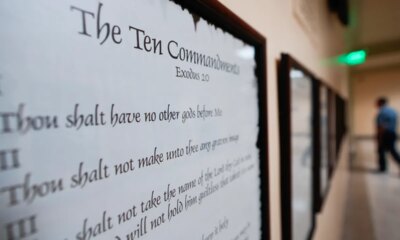Education
Video: The Public School Programs Trump Has Threatened

The Trump administration has a new directive for U.S. public schools: Cut D.E.I. programs or face federal funding cuts. Dana Goldstein, who covers education for The New York Times, describes what programs might be targeted by the directive, which is already being challenged in court.

Education
After F.B.I. Raid, Los Angeles School Board Discusses Superintendent
Board members are having an emergency meeting a day after agents raided the home and office of Alberto Carvalho, the Los Angeles Unified School District superintendent. The F.B.I. also searched the Florida home of a consultant with ties to the schools chief.
Education
How A.I.-Generated Videos Are Distorting Your Child’s YouTube Feed
Experts caution that low-quality, A.I.-generated videos on YouTube geared toward children often feature conflicting information, lack plot structure and can be cognitively overwhelming — all of which could affect young children’s development.
Education
Video: Blizzard Slams Northeast with Heavy Snow, Disrupting Travel

new video loaded: Blizzard Slams Northeast with Heavy Snow, Disrupting Travel
transcript
transcript
Blizzard Slams Northeast with Heavy Snow, Disrupting Travel
Several cities across the Northeast received at least two feet of snow, bringing many places to a standstill.
-
“I hope our students enjoy their snow day today and stay warm and safe throughout, but I do have some tough news to share. School will be in-person tomorrow. You can still pelt me with snowballs when you see me.” “It’s probably about the worst I’ve seen. I mean, I was here with the last big storm. I think that was where in 2016 or something. But it wasn’t as bad as this. And the problem is, when the plows come past, they just throw up all the snow. And there’s going to be a big bank here later. So I’m digging it out now to get rid of some of this.” “I do ski patrol on the Lower East Side. I like to check the parks, and sometimes I find people fall in the snow and they can’t get up, like a elderly gentleman went out in his pajamas to get a quart of milk. So, things like that.” “And if you can cook at home, please do so instead of ordering food to be delivered given the conditions. Make an enormous pot of soup and bring some to your neighbors upstairs.”

By Meg Felling
February 23, 2026
-

 World1 day ago
World1 day agoExclusive: DeepSeek withholds latest AI model from US chipmakers including Nvidia, sources say
-

 Massachusetts2 days ago
Massachusetts2 days agoMother and daughter injured in Taunton house explosion
-

 Montana1 week ago
Montana1 week ago2026 MHSA Montana Wrestling State Championship Brackets And Results – FloWrestling
-

 Oklahoma1 week ago
Oklahoma1 week agoWildfires rage in Oklahoma as thousands urged to evacuate a small city
-

 Louisiana4 days ago
Louisiana4 days agoWildfire near Gum Swamp Road in Livingston Parish now under control; more than 200 acres burned
-

 Technology6 days ago
Technology6 days agoYouTube TV billing scam emails are hitting inboxes
-

 Denver, CO2 days ago
Denver, CO2 days ago10 acres charred, 5 injured in Thornton grass fire, evacuation orders lifted
-

 Technology6 days ago
Technology6 days agoStellantis is in a crisis of its own making























